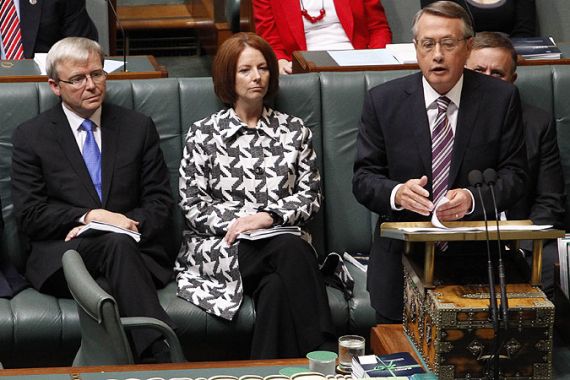Rudd departure shakes Australian government
Foreign minister steps down, saying he has lost support of PM Gillard amid speculation he is plotting return to top job.

Australia’s government faces a mounting crisis after Kevin Rudd, the country’s foreign minister, said he was resigning from his post over a widening rift with Julia Gillard, the prime minister.
“The simple truth is that I cannot continue to serve as foreign minister if I don’t have Prime Minister Gillard’s support,” Rudd told a news conference late on Tuesday in Washington, where he had earlier attended a meeting of G20 foreign ministers.
Gillard said she was disappointed by Rudd’s resignation and planned to hold a press conference on Thursday.
“I am disappointed that the concerns Mr Rudd has publicly expressed this evening were never personally raised with me, nor did he contact me to discuss his resignation prior to his decision,” Gillard said.
Speculation has been rife in Australia that Rudd is planning to reclaim the prime ministerial post almost two years since he was replaced by Gillard in June 2010 after losing the support of Labor Party leaders.
Gillard has refused to comment on those reports, saying she had already answered many questions about the leadership, while Rudd has dismissed the rumours as a “soap opera”.
“I can promise you this: There is no way – no way – that I will ever be party to a stealth attack on a sitting prime minister elected by the people,” Rudd said in his resignation speech, in a scarcely concealed dig at his successor.
“We all know that what happened then was wrong and it must never happen again.”
Al Jazeera’s Andrew Thomas, reporting from Sydney, said there was “intense speculation” in Australia following Rudd’s resignation.
‘Still sore’
“He is still very sore about the way he was deposed,” said our correspondent, referring to the way in which Gillard replaced him.
“Gillard’s poll numbers have declined; meanwhile Rudd’s poll numbers have remained quite high,” he said, adding that many thought he stood a better chance at the leadership now.
Our correspondent said Rudd would travel back to Australia and was expected to make an announcement on Sunday, before parliament convenes on Monday.
Rudd became prime minister in 2007 after a landslide electoral win which ended more than a decade of conservative rule.
His sudden replacement by Gillard took most Australians by surprise, and there is still some sympathy among voters for the way he has been treated.
Gillard leads a fragile minority government after failing to secure Labor a majority at a 2010 election. She has struggled with unpopular policies and poor opinion poll ratings that suggest the party would be voted out of power were an election held tomorrow.
Gillard’s deputy on Wednesday launched a scathing attack on Rudd’s past record as prime minister and party leader, accusing him of “dysfunctional decision making” and a “deeply demeaning attitude” towards his colleagues.
“For too long, Kevin Rudd has been putting his own self-interest ahead of the interests of the broader Labor movement and the country as a whole, and that needs to stop,” Swan said.